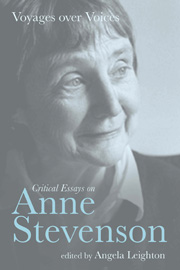Book contents
- Frontmatter
- Contents
- Notes on Contributors
- Acknowledgements
- ‘Making Poetry’
- 1 ‘Voyages over voices’: Introduction
- 2 The Melting Metaphor
- 3 ‘Between us’: Letters and Poems of Stevenson and Bishop
- 4 Mothers, Mirrors, Doubles: Anne Stevenson's Elegies for Sylvia Plath
- 5 Staging Second Thoughts: The Poetry of Anne Stevenson
- 6 ‘Making Poetry’: The Exemplary Anne Stevenson
- 7 ‘A curved adventure’: Romanticism and the Poetry of Anne Stevenson
- 8 The Nature of Anne Stevenson
- 9 Anne Stevenson and the Poetry of Place
- 10 Compacting Time: Anne Stevenson's Poems of Memory
- 11 ‘Not exactly a persona’: Pronouns in Anne Stevenson's Poetry
- 12 ‘To serve a girl on terrible terms’: Anne Stevenson's Writing Selves
- 13 Talking and Singing: Anne Stevenson's Variations on a Rhythmical Theme
- 14 ‘Time will erase’: Anne Stevenson and Elegy
- 15 Observing the Overhearing: The Anne Stevenson Papers in Cambridge University Library
- 16 Bibliography of Anne Stevenson's Published Works
- General Index
- Index of Stevenson's Works
9 - Anne Stevenson and the Poetry of Place
- Frontmatter
- Contents
- Notes on Contributors
- Acknowledgements
- ‘Making Poetry’
- 1 ‘Voyages over voices’: Introduction
- 2 The Melting Metaphor
- 3 ‘Between us’: Letters and Poems of Stevenson and Bishop
- 4 Mothers, Mirrors, Doubles: Anne Stevenson's Elegies for Sylvia Plath
- 5 Staging Second Thoughts: The Poetry of Anne Stevenson
- 6 ‘Making Poetry’: The Exemplary Anne Stevenson
- 7 ‘A curved adventure’: Romanticism and the Poetry of Anne Stevenson
- 8 The Nature of Anne Stevenson
- 9 Anne Stevenson and the Poetry of Place
- 10 Compacting Time: Anne Stevenson's Poems of Memory
- 11 ‘Not exactly a persona’: Pronouns in Anne Stevenson's Poetry
- 12 ‘To serve a girl on terrible terms’: Anne Stevenson's Writing Selves
- 13 Talking and Singing: Anne Stevenson's Variations on a Rhythmical Theme
- 14 ‘Time will erase’: Anne Stevenson and Elegy
- 15 Observing the Overhearing: The Anne Stevenson Papers in Cambridge University Library
- 16 Bibliography of Anne Stevenson's Published Works
- General Index
- Index of Stevenson's Works
Summary
At some point in the late 1960s or the early 1970s, while she was living in Glasgow, Anne Stevenson penned the following lines:
Pigeons, pee-gulls,
urchins, equals,
civic defecators,
public decorators,
deacons, dowagers,
skarters, scavengers,
earth-boats, roof-ducks,
doxies for noon-drunks,
puffed up anyhow,
citizens of Glasgow.
An ordinary scene in the middle of an ordinary day: it is easy to imagine her having stopped for lunch in the sunshine and pausing to take stock. The poem is titled ‘Pigeons in George Square’ and was published in an anthology, but it has never been collected in any of Stevenson's own volumes. Perhaps it seemed too slight. T.S. Eliot might have called it a ‘Five-Finger Exercise’, like his ‘Lines to a Duck in the Park’.
Yet in its combination of the panoramic and the particular, the poem neatly indicates some of the characteristic ways in which Stevenson's poetry depicts people and places, and situates itself among people and places. ‘The way you say the world is what you get’, Stevenson declares in ‘Saying the World’. (She then borrowed the line for the title of the first section of Poems 1955–2005, a large section devoted to poems of place.) If ‘Pigeons in George Square’ presents an ordinary noon in Glasgow, its voice, its way of saying the world, is much less ordinary. Declining to introduce an I, a speaker, the voice of the poem nevertheless places its act of observation.
- Type
- Chapter
- Information
- Voyages over VoicesCritical Essays on Anne Stevenson, pp. 125 - 150Publisher: Liverpool University PressPrint publication year: 2010



